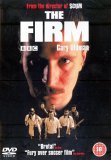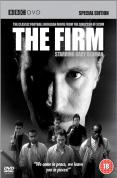![I.D. [1995]](/pictures/1004340.jpg) I.D. | DVD | (02/02/2009)
from £6.29
| Saving you £4.96 (98.61%)
| RRP
I.D. | DVD | (02/02/2009)
from £6.29
| Saving you £4.96 (98.61%)
| RRP Intense, ferocious and deeply unsettling, I.D. is an excellent examination of Britain's unsavoury contribution to global culture: football hooliganism. Whereas Alan Clarke's The Firm showed the violence that lurked behind a seemingly normal façade, I.D. posits football hooliganism as a feral temptation. Dedicated, ambitious undercover policeman John (Reece Dinsdale) becomes seduced by the violence of an East London gang, ultimately becoming lost from his regular life with his wife (Clare Skinner). Dinsdale delivers a measured performance that sees him spiral from committed, right-minded policeman to shaven-headed, Nazi-saluting monster, revelling in the violent impulses he embraces with glee and, alarmingly, becoming a hero amongst those he is infiltrating. Warren Clarke is absolutely monstrous as the leader of the hooligan gang, a paragon of bigoted hatred and the embodiment of John's future. Often unnervingly realistic, director Phil Davis is adept at creating riotous mob scenes that chillingly accentuate the world into which John is drawn. It could be said that I.D.'s premise is too thin, and that hooliganism is not addressed in an effective manner, but it is without doubt a chilling character study of the temptation of violence and the horrific influences that lurk in the heart of society. --Danny Graydon
 The Firm (Gary Oldman) | DVD | (02/02/2004)
from £8.21
| Saving you £-2.22 (N/A%)
| RRP
The Firm (Gary Oldman) | DVD | (02/02/2004)
from £8.21
| Saving you £-2.22 (N/A%)
| RRP Gary Oldman is Bex Bissek a respetable estate agent who loves his wife loves his son and loves his violence. Bex is the leader of a gang of football supporters known as the Inter-City Crew; his firm. He plans to unite rival firms and lead them all to the European Championship in Germany a chance to take on the locals. But that's a position he's going to have to fight for. With its graphic scenes of running battles with knives sledgehammers and baseball bats The Firm caused huge controversy and there were demands for it to be banned. As The Sun newspaper reported it is the most powerful and disturbing drama since Scum.
![A Very Unlucky Leprechaun [1998]](/pictures/1010024.jpg) A Very Unlucky Leprechaun | DVD | (03/09/2001)
from £N/A
| Saving you £N/A (N/A%)
| RRP
A Very Unlucky Leprechaun | DVD | (03/09/2001)
from £N/A
| Saving you £N/A (N/A%)
| RRP Nine year-old Molly and her father move to Ireland to a house they've inherited nicknamed Misfortune Manor. It brings bad luck to anyone who lives in it and Molly and her father soon fall victim to the curse: they will lose their new found home unless they can pay the taxes owed on it. Then Molly discovers a leprechaun living on the grounds and befriends him. His luck has run out too because he hasn't eaten a four-leaf clover in over a hundred years. The bad luck begins to rub off on Molly getting her into all kinds of trouble. Finally Molly turns things around by growing a four-leaf clover. Can Molly get the four-leaf clover to the leprechaun in time? Will the leprechauns magic return or will the evil landlords win the day? Find out all the answers in this hilarious and enchanting fun-filled family adventure!
![The Firm [1989]](/pictures/1018515.jpg) The Firm | DVD | (05/02/2001)
from £20.00
| Saving you £-4.01 (N/A%)
| RRP
The Firm | DVD | (05/02/2001)
from £20.00
| Saving you £-4.01 (N/A%)
| RRP These days people are dangerously nostalgic about the sinister tackiness of the 1980s, but there's no stiffer antidote to such delusion than Alan Clarke's The Firm. This unforgettable film was made as a one-off drama for the BBC in 1988, but its cult following has grown steadily through video, thanks to a startling central performance from a young Gary Oldman, and the riveting manner in which Clarke captures the lethal, mindless energy of football hooliganism. Oldman plays Clive "Bexy" Bissell, working-class East London boy done good: a prosperous estate agent, proud homeowner, happy husband and doting father. But his chief pleasure is to be team leader ("top boy") of a bunch of overgrown yobs who attend football matches in order to cause violence. At weekends Bexy leads his "Inter City Crew" into rucks with rival warlords such as Yeti (Phil Davis) and Oboe (Andrew Wilde), in search of what he calls "the buzz", no matter the cost to his young family and his future prospects. The Firm was entirely shot on SteadiCam, enabling Clarke to drop the viewer right into the thick of the action and exploit some hair-raisingly authentic rowdiness from his talented cast. Among these thugs, soap fans will spot Eastenders' Steve McFadden and Charlie Lawson of Coronation Street. The Firm is a masterpiece of social-realist drama, and one of the most virulently anti-Thatcherite films of its time. An avid supporter of Everton FC, Clarke responded to Al Hunter's script because he felt that the vicious idiots spoiling football were a new breed of disgrace. The tabloids raised a stink about the film's violence, and the BBC delayed its broadcast until 1989. A year later, Alan Clarke died of cancer, But The Firm is a tremendous last testament from the finest English director of his generation. --Richard Kelly
 The Firm | DVD | (21/08/2006)
from £N/A
| Saving you £N/A (N/A%)
| RRP
The Firm | DVD | (21/08/2006)
from £N/A
| Saving you £N/A (N/A%)
| RRP 
Please wait. Loading...
This site uses cookies.
More details in our privacy policy